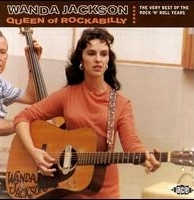
- Format: MP3

Ace Records' Queen of Rockabilly is such a good idea for a Wanda Jackson collection that it's astonishing that it didn't get put together and released until 2000 -- or that Bear Family Records, which is no slouch when it comes to distilling down certain aspects and angles of American country and rock & roll stars, didn't do it first. It should have been out a lot earlier, in the 1970s -- that would have saved hundreds of listeners (maybe thousands, around the world) having to buy, borrow, or steal her old LPs and singles, so we could isolate and distill down her rockabilly and rock & roll tracks onto open-reel tape or audio cassette. Compiler/annotator Rob Finnis allows the songs to jump across seven years, back and forth, pulling together the strands and threads of this side of Jackson's work into a killer collection of 30 songs, clocking in at less than 70 minutes. And running through the rough and raucous rock & roll sounds is the enigma of Wanda Jackson herself -- this CD touches more musical and cultural buttons than even the man who put it together seems aware of, or than Jackson herself will ever admit to. She has said that she was never as consciously committed to rockabilly or rock & roll as her career direction would seem to indicate; she spent years walking a tightrope between traditional country and rock & roll, just trying to carve out a niche for herself and earn a living, and rock & roll was as new to her as it was to most country music fans in 1954-1955. In keeping with the sensibilities of the era, as the daughter of white working-class Texas-born transplants to Oklahoma (and then to California -- around Bakersfield, natch -- and back to Oklahoma), blues and R&B, as something that she would do herself or allow herself to be influenced by, were mostly alien to her when she began exploring the music (with help and encouragement from Elvis Presley) in 1955.
Luckily, the King of Rock & Roll was correct in his assessment of Jackson as a natural, and she became the Queen of Rockabilly at a time when Janis Martin was "the Female Elvis" and Brenda Lee was some child mutant doing rock & roll with some success. Jackson even recorded with a mixed-race band, the Poe Cats (including Big Al Downing), beginning in early 1958, and the records were amazing, although they didn't start selling seriously until 1960, when a DJ started playing "Let's Have a Party," a three-year-old track off of her 1957 debut LP, and Capitol got it out as a single. She was suddenly on the pop charts, as a unique voice and personality by then, and her career, which had started to coast, was suddenly thrown into high gear. It's all here, the astonishingly raucous and even raunchy early singles like "Hot Dog! That Made Him Mad" and "Fujiyama Mama" (the latter a huge hit in Japan, amazingly enough), the LP renditions of "Long Tall Sally" and "Rock Your Baby," and the raw, throat-ripping performances of "Rip It Up," from as late as 1963. There are some especially amazing moments amid the rip-roaring rock & roll that even Finnis misses, such as Jackson's rendition of Chuck Berry's "Brown Eyed Handsome Man." The song itself was Berry's commentary on the plight of the black man in white society, but for a white Southern woman rocker to sing it in 1961, even on an LP, while Berry was in the middle of his first-round trials for alleged illicit activities with an underage girl, was an amazingly challenging and provocative act -- Finnis extends the effect by following it with the later LP track "You Don't Know Baby," a slow, smoldering blues that Jackson makes work as a woman's song. She's equally bold and convincing on Little Richard's "Slippin' and Slidin'" from the same session as the Berry song; of course, in 1958 Jackson was also singing "Rock Your Baby," with its demand "Rock your baby all night long, and don't be slow" -- a song she wrote herself, no less. By the time it's over, this CD will make one wonder if Jackson -- her denials and professed innocence notwithstanding -- was the most sexually and musically subversive white woman ever to step in front of a microphone. The sound is great too, up to Ace's usual high standard and then some.